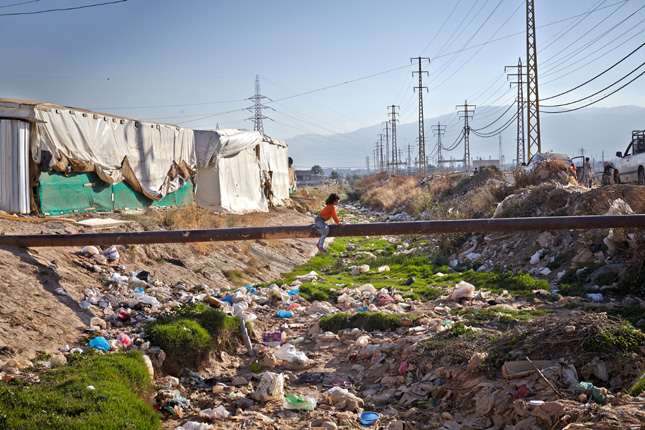-
Behind the Headlines, Emerging Security Threats in the Middle East

The Middle East, as much as ever, is the focus of international attention, but the obvious crises may be a distraction from deeper underlying issues.
Instability in the Middle East is usually assessed and addressed through the parameters of regional and global security. The blunted ambitions of the Arab Spring and ongoing civil wars in Syria and Yemen have had serious international repercussions. The expansion of the Islamic State has galvanized an unlikely coalition of foreign militaries, while efforts to negotiate settlements in Syria and Yemen are precarious. The quest for dominance by powerful regional actors is as strong as ever. And the Israeli-Palestinian conflict continues smoldering.
While all these crises are necessary to deal with in the short term, we argue that more attention needs to be paid to longer-term challenges as well – demographic pressures, food and energy supplies, water and arable land, and the effects of climate change. These are not direct security threats, like the Islamic State, but rather are incrementally growing behind the headlines and may contribute to more immediate threats in the years to come.
In our new book, Emerging Security Threats in the Middle East, we have tried to locate and critically analyze some of the arguably broader security challenges of the region beyond present crises.
Food and Water
Food availability, water scarcity, energy development issues, and large population migration are all challenges that are set to increase in importance. Climate change and processes of globalization add further to regional complexities and challenges.
Regimes in the region, in their effort to hold onto power, have neglected sustainable economic development and favored short-term, situational development. This approach has led to unsustainable use, management, and, in some cases, destruction of natural renewable and non-renewable resources.
The Middle East has the lowest water availability and productivity in the worldThe Middle East as a whole has the lowest per capita water availability in the world. At the same time it has also one of the highest rates of population growth. Governments have largely focused on supply management, through desalination for example, while not focusing enough on managing demand. The region is heavily dependent on transboundary rivers and aquifers, and current cooperation over these resources is minimal. That needs to change.
But that will not be nearly sufficient. There is a need to focus on water governance too, including addressing subsidies for agricultural water, which currently encourage great waste. It is far more important to manage water demand than trying to increase supply, and there is enormous room for progress in this respect. The region has the lowest water productivity in the world.
Related to both water and energy, food security is a major challenge as well. Regimes in the region have historically focused on achieving food self-sufficiency at the national level. While increased national agricultural production is important, not least since large parts of the population are directly or indirectly dependent on the sector, it is often not sufficient to provide sustainable food security. Long-term food security in the Middle East – and indeed, long-term stability – requires a comprehensive approach that includes sustainable agricultural productivity, agricultural trade, and guarantee of adequate, affordable, nutritious food for all people.
Several factors, including a lack of income opportunities and the absence of effective social safety nets, pose a challenge to the ability of large segments of the population to achieve food security. States in the region need to rethink their self-sufficiency strategies and focus on expanding access for people instead, regardless of where the food comes from (though poor water productivity, again, perhaps hints at the possibility of higher returns if water management changes for the better).
A Basis for Human Security
For the Middle East to achieve working peace and stability, governments would do well to pursue more sustainable economic policy for growth and development. The unique nature of the region’s resources and demographics – including its reliance on what may be waning hydrocarbon reserves – should be reflected in policy.
Local needs and the protection of environment have to be prioritized for sustainability to be achieved. Human security, including reliable access to water, energy, and food, should be the primary objective, and this requires a comprehensive policy move from the centrality of the state to the centrality of the individual.
Ordinary people in the region, like in many other parts of the world, struggle to make a living and hope for a better future. Long-term stability cannot be achieved through force or intervention – rather it is by enhancing the potential for political participation that the structural basis of authoritarianism is weakened and ultimately the region moves toward sustainable peace.
Anders Jägerskog is counselor for regional water issues in the Middle East and North Africa for the Embassy of Sweden in Amman, Jordan. The views expressed by Jägerskog do not necessarily reflect the views of the Swedish International Development Co-operation Agency or the Swedish Government.
Ashok Swain is a professor at the Department of Peace and Conflict Research and Department of Earth Sciences of Uppsala University, Sweden. He is also the director of the Research School for International Water Cooperation.
Sources: Stockholm International Water Institute, Swain and Jägerskog (2016), World Bank.
Photo Credit: An informal settlement outside Zahle, Lebanon, January 2000, courtesy of S. Baldwin/UNHCR.
Topics: Africa, agriculture, climate change, conflict, democracy and governance, demography, development, economics, Egypt, energy, environment, environmental security, featured, food security, Guest Contributor, human rights, humanitarian, international environmental governance, Iraq, Israel, Jordan, Lebanon, livelihoods, Middle East, migration, natural resources, oil, population, Saudi Arabia, security, Syria, Turkey, water, Yemen, youth
 A Publication of the Stimson Center.
A Publication of the Stimson Center.






